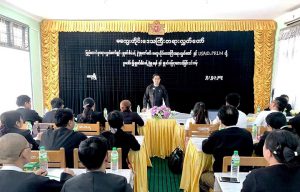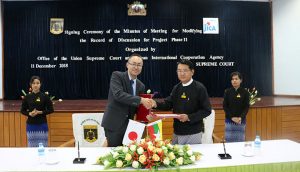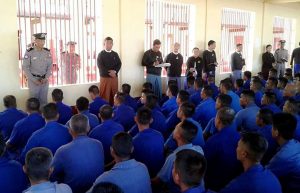The Supreme Court of the Union launched its Judicial Strategic Plan (2018-2022) at the Myanmar International Convention Centre II, Nay Pyi Taw, in January 2018, addressing changes not only for judges, but also for participants and members of the media.
The second strategic plan for the Myanmar judiciary sector has been adopted with the motto “Towards Improving Justice for All”; comprising five working spheres prioritizing in three stages.
The responsible members of the Supreme Court of the Union clarified information on the tasks being undertaken on the third year of the incumbent government in their interview with news team.
U Ko Ko Naing, Permanent Secretary, The Supreme Court of the Union.
Question: Kindly explain the implementations on the aims and objectives of the Supreme Court of the Union during the third year of the incumbent government.
U Ko Ko Naing: Judicial Strategic Plan (2018-2022) is underway with the motto “Towards Improving Justice for All”; comprising five working spheres prioritizing in three stages under the reform implementation of the Supreme Court of the Union for the third year during incumbent government.
With (14) aims and objectives, the plan outlines five year strategic initiatives, actions for year one action plan (2018), a set of priority rank for implementation and key performance targets with timelines.
Question: Please explain on the international cooperation by the Supreme Court of the Union.
U Ko Ko Naing: In connection with the environmental issue and the climate change topic, the Supreme Court of the Union is cooperating with the Asian Development Bank; the United Nations Environment Programme, and the Asian Judges Network on Environment (AJNE).
The opening ceremony of Asian Pacific Judicial Conference on Environmental and Climate Change Adjudication was held in Nay Pyi Taw. Myanmar hosted the conference on 29 and 30 October 2018.
Over 200 participants across Asia-Pacific, including judges and legal stakeholders, academics, litigators, and civil society representatives discussed;
• the environmental and climate change challenges faced by countries in Asia and the Pacific, particularly their judiciaries;
• the impact of climate change on vulnerable groups;
• the issues of urbanization, ship-breaking, and waste;
• community action geared towards protecting the environment and addressing climate change;
• regional and global judicial perspectives about the role of judges in dealing with climate change; and
• the latest developments and challenges in environmental and climate change litigation.

Question: Please explain the training course imparted to judicial officers.
U Ko Ko Naing: The MoU was signed between the National Judicial Academy of India and the Office of Union Chief Justice on Training and Capacity Building Programme for Myanmar Judges and Judicial Officers.
JICA inked capacity development project with Myanmar and signed the Memorandum of Understanding on Judicial Cooperation Between the Supreme Court of the Union in the Extension of Project for Capacity Development of the Legal, Judicial and Relevant officers on the Project Phase Two.
Establishment of the Council of ASEAN Chief Justices (CACJ) Secretariat and finalization of CACJ Charter was being carried out and that Myanmar would soon sign CACJ Charter.
Myanmar judicial officers attend regularly various workshops, conferences and seminars held in the country and abroad.
Judicial officer are dispatched to attend degree courses including Ph D in Australia, UK, Japan, Republic of Korea, and the People’s Republic of China.
On 9 October 2014, the Ministry of Law of Singapore and the Supreme Court of the Union signed the Singapore-Myanmar Integrated Legal Exchange. With the agreement, the cooperation with Singapore has elevated the capacity of Myanmar judicial officers, and that Myanmar representatives have been dispatched to Singapore for (8) times.
Question: Please tell us about law court buildings and premises.
U Ko Ko Naing: In 2018, new court buildings are commissioned in Tatkon Township; Pathein Township; and Maungdaw District in conformity with the international standard for the convenience of the clients including the disabled persons and the law officials in the functioning of the law proceedings.
Moreover, a plan is underway in establishing a Judicial College in upgrading the capacity of the judges. Furthermore, added skills on ICT are also being provided to the officers.
When the Pyidaungsu Hluttaw Law No. 73/2015 has enacted the Law Amending the Myanmar Evidence Act (Burmese), more ICT devices are required for the law proceedings at the law courts.

Question: Kindly explain the key implementations in 2018.
U Ko Ko Naing: The year 2018 saw the key implementations of issuing relevant by-laws and offering of legal assistance for those who could not afford legal advisors and the formation of assisting teams and centers at various levels.
The legal assistance centers offer free legal services to anyone who has been charged with a crime and cannot afford to hire a lawyer, anyone who is under the age of 18, minorities, and those who are disabled or discriminated against. The main tasks to be carried out in the 2019 have been announced.
Relevant sections would be attached at the law courts for more information and access required by the public, and that the Website of the Supreme Court of the Union is offering yearly law reports, the crime situation, and the reports on commercial abuses, in addition to regular law news.
Question: Please tell us on the services rendered by the law courts.
U Ko Ko Naing: The Website, the Public Relation Department and the Social Media Pages have timely provided information such as that of the date of court ruling; that of the date of case hearing; and other relevant news.
Moreover, the Internet Pages of the Supreme Court of the Union has been linked up with the Asia Judiciaries Portal (AJP) for expanding the information.
Furthermore, the tasks and the activities of the Supreme Court of the Union are being uploaded on the Myanmar National Portal prepared by the Ministry of Transport and Communications along with the news of other central organizations and the ministries.
Plans are underway in creating Websites for the law courts of the states and the regions.
Daw Tin Nwe Soe, Director-General, the Judicial Supervision Office of the Supreme Court

Question: Kindly explain the proceeding on the civil suit cases.
Daw Tin Nwe Soe: The launching ceremony on Court-Led Mediation Pilot Program” was held by the Supreme Court of the Union at Myanmar International Convention Center-2 on 26th February. In accordance with this initiative, Court-Led Mediation Pilot Program are being implemented in Dekkhina District Court, Taungoo District Court, Takkone Township Court and Taungoo Township Court on 1st March 2019 in collaboration with JICA.
This is the leading role of the Supreme Court of the Union in the implementation of alternative dispute resolution (ADR) system in Myanmar as a requirement.
The system included the judges and the legal negotiators, who are to handle cases in accordance with the prescribed manuals of the Code of Civil Procedures. The proceedings are to be kept in discreet as the clients are dealing in persons with each other independently and freely.
As the mechanism resulted with faster result with lesser expenses, both parties are satisfied in this new method of solution. It brings positive results to the advantages of the clients.
Question: Please deal with the hot issues these days, and also on the feedback of the people.
Daw Tin Nwe Soe: Public took interest in some cases as the persons involved are well known and celebrities. Generally speaking, in some cases, the public as well as the security people have a lot of interest when the case is tangled and twisted with heavy offenses. However, some of the cases are quite normal, but the people involved deliberately created and drew the attention of the public. Whatever the nature of cases may be, the courts consider only in line with the existing laws.
When the public pay more attention on some cases, the courts took special care for accurate information and release of news. It arranges meetings and interviews for the interest of the public. In 2019, plans are being made to release news in time over the cases that are interested by the public.
Question: Are the public has more trust and confidence over the judicial system?
Daw Tin Nwe Soe: The main aim and objective of the law courts are to draw the confidence and trust of the people. In this regards, we take opinions from the public at a certain time whether they are satisfied with the result. The coverage involved members of police force, government officials, clients, lawyers, witnesses, and friends. A total of (2866) persons had been asked and consulted in 2018 which happened to be (71) per cent. We have intended and targeted for (75) per cent. However, (56) per cent of the respondents are satisfied with the survey, and therefore, 2018 is much better than the year 2015.
Question: Please tell us about the advantages and disadvantages judiciary on the third year of the incumbent government.
Daw Tin Nwe Soe: The advantage in 2018 is the case disposal percentage that stood at (98) per cent. The year 2017 saw (96) per cent. We are trying to achieve (100) per cent case disposal. The disadvantage is the issue of delayed cases. According to the statistics, (5) per cent remained to be delayed for more than (12) months, and that in the civil suit cases (8) per cent delayed was found for (36) months.
We have also recorded the number of postponement of hearing at the courts. It is found (35) per cent postponement in criminal cases, and (29) per cent in civil suit procedure cases. The reasons of postponement found to be the absent of persons from both sides, and that we are trying our best to reduce the postponement at the law courts.
Question: Tell us about the future implementation tasks.
Daw Tin Nwe Soe: Priority Actions for 2019 have been announced on 14 February. We will implement the legal cases management program so as to manage the legal cases not to lingering, not to lengthening, and finishing them in time. We are now expanding the number of the court of justice that are targeted in the program from 23 townships and districts in 2018 to 48 townships and districts in 2019.
Question: Please explain over the postponement cases.
Daw Tin Nwe Soe: With a view to avoid delay and postpone the cases, all relevant persons from both sides involved in the case must never be absent on the day of hearing. When all the persons appeared as arranged, there would be no postponement of the cases. Therefore, it is very much vital that all people must come forward as arranged by the law courts across the country.
Also in civil suit cases, all the clients from both sides must appear before the courts as arranged by the responsible persons.
During the third year period of the incumbent government, the implementation involved such as that of handling criminal cases; that of criminal management planning; that of Pilot Program of the Court-led Mediation in Civil Suits; that of working in accordance with the prescribed laws; that of inspection on prison, cultivation, production, police cell; that of the activities of the lawyers and advocates.
Question: Please tell us on the issuance of lawyer’s license to practice law.
Daw Tin Nwe Soe: The Supreme Court of the Union has issued (553) licences to Advocate; (1016) licences to Higher Grade Pleaders; and (2065) licences to Intern Lawyers. Actions are being taken against (8) High Grade Pleaders and (14) Advocates. License to practice law have been re-issued to (6) Advocates and (2) High Grade Pleaders.
U Myint Wai, Chairman, Union Legal Aid Board, Nay Pyi Taw, Uttarathiri Township
Question: Please explain the task and work program of the Legal Aid Board.
U Myint Wai: Pyidaungsu Hluttaw Law No. 10/2016 has enacted the Legal Aid Law in 2016, and subsequently formed the Union Legal Aid Board; State and Region Legal Aid Boards; and Township Legal Aid Boards.
The Union Legal Aid Board has established offices in townships for helping poor people and those who lose legal rights.
We are providing legal assistances to the people who asked assistances in accordance with the legal aid law.
The Union Legal Aid Board conducted pilot tests on ways to provide legal aid to poor people, and rendering legal assistances to them.
Question: Kindly explain on the delay in court proceeding.
U Myint Wai: We heard some remarks among the public that there are delays in court proceedings. In fact, when a trial is ongoing at a law court, the situation required the presence of all concerned such as law office personnel, Myanmar Police Force, lawyers from both sides, and the witnesses. The delay of court proceedings is due to the reason of absence of witnesses from the civil side, the administrative side and the departmental side. The departmental side means the prosecuting organizations such as the officials from the Myanmar Police Force, the Forest Department, the Immigration and Population Department.
It is of the view that the delay of court proceeding could be reduced if the public appeared at the law courts without fail, and that is the duty of citizens to stand witness at courts and reduce the delays of proceedings.
Thank you.
Translated by UMT (Ahlon)



